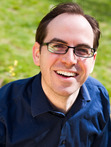Adam Szymkowicz's Blog, page 87
October 27, 2012
I Interview Playwrights Part 514: Brian Golden
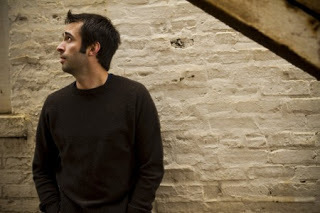
Brian Golden
Hometown: Davenport, Iowa
Current Town: Chicago, Illinois
Q: What are you working on now?
A: I'm working on JOHNNY, a new play about missing children inspired by a famous case from Iowa in the 1980s, which will World Premiere at Theatre Seven of Chicago in June, as well as on curating a series of short plays about great Chicago women from the last 100 years to mark the 100th anniversary of women's suffrage in Illinois. That's called UNWILLING AND HOSTILE INSTRUMENTS and will go up in late summer 2013.
Q: Tell me, if you will, a story from your childhood that explains who you are as a writer or as a person.
A: Wouldn't life be easier to understand if there were one specific moment you could point to dramaturgically and say: here is why! But I don't think there is. As ridiculous as it might sound, I think that being a hugely passionate Iowa State Cyclones fan growing up in enemy territory (right near the University of Iowa) really shaped a lot of my personality. My team was also bad, so bad, and I'd just get made fun of constantly for all of grade school and junior high for being a State fan. I think it built a real empathy for the underdog, not just in sports, but in the way I look at the world, and maybe some of the characters I enjoy reading and writing about on stage. I admire people who stand strong against the conventional social order and who fight to change it. My biggest enemies are people who have power and use it recklessly, to hurt someone else, or keep them down. I remember one time when I was maybe 11 sobbing after Iowa State lost to Iowa in football for what was probably the 10th year in a row and my Mom sat me down to say "you know, you don't have to cheer for Iowa State, it is a choice." And I remember feeling like "no, it is not a choice. This is who I am." So I think there was an identity really crystallizing in terms of being comfortable bucking the status quo.
Q: If you could change one thing about theater, what would it be?
A: Wow, I don't know. I think theatre's power is really as an engine for local storytelling. Doesn't mean there shouldn't ever be any plays produced in Chicago that are set in London, but I wish that more work was really local - about the city, region or even city block where the work is being shared. I think that as the world shrinks, and TV news and movies can take us global so quickly and easily, the power of theatre will always be to tell a story really relevant to the 100 people in the room that night. In Chicago we have a nice culture of Chicago-based storytelling, and Theatre Seven (the company where I am the Artistic Director) is a part of that. But I wish that in Davenport, Iowa, Omaha, Nebraska, Santa Fe, Tupelo, everywhere - that we could commune over more stories told about local history, people and problems. I think that if an alien race were learning about America from its plays, it would make some interesting observations, among them that 80% of the American population lives in Manhattan.
Q: Who are or were your theatrical heroes?
A: Too many to name, truly way too many to name. Chicago is a city full of hard-working, ass-kicking, new work making, next generation theatre makers. I admire anyone willing to start something new and say "I have a vision for the future of this form," but I also admire the people who have gone before, like the folks who made Steppenwolf, Goodman, Victory Gardens, Black Ensemble, Lookingglass who have helped theatre carve out a place in the conversation in our city. I truly admire arts administrators, who get an awful name among playwrights and artists. But someone who can run the business end of an arts organization that truly serves a mission and a population is someone who is really special. I'll always have on my list of heroes Andrea, Anna, Carter, Bill, Jeffrey and all my professors at Washington University. I guess my personal heroes are anyone who has ever entered a collaboration with me and given me their trust - whether that was as a director or producer and believing in my work, or as an actor and saying the first line and trusting the play would carry them through. 100% selfishly, those are my personal heroes. I hope I haven't let them down.
Q: What kind of theater excites you?
A: Theatre that matters. It doesn't have to 'change the world,' but don't waste my time. Make it count. I'd rather see a flawed play that matters than a perfect play that makes me wonder why it exists.
Q: What advice do you have for playwrights just starting out?
A: Write. Be persistent. Seek advocates, not attention. If they tell you to submit the play a certain way on their website, believe them. If they tell you they like your work, hold them to it. Have a good website so they can find you. Don't overcommit. If you can figure out how to get productions, please email me.
Q: Plugs, please:
A: Directing Professional World Premiere of Carter W. Lewis' AMERICAN STORM at Theatre Seven of Chicago, opening November 16th. (www.theatreseven.org)
Directing Staged Reading Fouad Teymour's THE NIGHT JESUS JOINED THE REVOLUTION at Silk Road Rising in early December. (www.silkroadrising.org)
Writing World Premiere of JOHNNY for Theatre Seven in June. (www.theatreseven.org)
And recently published in THE CHICAGO LANDMARK PROJECT, along with short plays about Chicago by Brooke Berman, J. Nicole Brooks, Aaron Carter, Lonnie Carter, Laura Jacqmin, Jamil Khoury, Rob Koon, Brett Neveu, Yolanda Nieves, Marisa Wegrzyn and the Red Orchid Youth Ensemble, available on Amazon.com here: (http://www.amazon.com/The-Chicago-Landmark-Project-Premiere/dp/1463573936/ref=sr_1_2?ie=UTF8&qid=1351026336&sr=8-2&keywords=the+chicago+landmark+project)







Published on October 27, 2012 08:56
October 26, 2012
I Interview Playwrights Part 513: Greg Romero
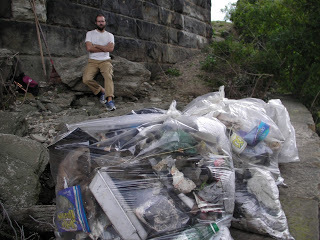
Greg Romero
Hometown: Greenwell Springs, Louisiana.
Current Town: Philadelphia, Pennsylvania.
Q: What are you working on now?
A: I am cleaning up the Schuylkill River in Philadelphia.
I love this river and want to create a performance project about it. But I want to learn the river more completely so I can best know how to express it. So I am asking the river to speak to me and hoping an appropriate return gift is to pick up the trash and litter and debris along its banks and in its waters. I have made the commitment to clean-up the river for 50 – 60 hours from now (mid-October) through the end of 2012. I have already gone out several times and loved every minute of it. I wish I could work for the river every day.
If a performance project results from this work, I will be thrilled. If not, I still will be thrilled, and for reasons I probably haven’t imagined yet (maybe it is a performance project already?).
Q: Tell me, if you will, a story from your childhood that explains who you are as a writer or as a person.
A: First-- I have three sisters, one of which is my twin. That explains me a little bit.
Also, several years ago I wrote to my mother, telling her I was looking closely at my name—that I was trying to discover things about it, trying to decide if it was best keep it, or if I should work to take on a new one.
This is her reply:
On Monday, July 27, 2009 4:52 PM, Nancy Mouton wrote:
Dear Greg,
A few weeks before you were born - and I didn’t know then what sex each baby was - your dad and I couldn’t come up with two girls names, nor two boys names, so we went with Melanie Claire, and Gregory John. Each name was different enough so that neither of you would have to follow in the shadows of the other.
We decided that when you were born, if you were girls, then we’d pick another girl name, and vice versa. I remember researching name meanings so that I wouldn’t call you both something that meant something awful. Also, having two older sisters I wanted each of you to have a unique name, not unusual, but not commonly used. I had a lot of down time while waiting for you, so I read a lot. I don’t really remember all the meanings from different languages, but I knew you needed a strong name.
And yes, you were not breathing when you were born.
They revived you then and they revived you again in the isolette. You actually died twice. Remember, I was there. Right before you were born, feet first I might add, the doctor and nurse worked hard to turn you so you could be born naturally. No such luck, so out you came breached and bruised. I remember telling you how I watched the clock for more than three minutes. My elbows were bruised because I was in shock while waiting and I shook so hard I rattled the gurney. I knew they were about to give up on you. Too much time had passed and chances for a healthy infant were almost none.
Greg, be prepared for what follows, as I never told you this. I am just remembering this now. It’s like I just went back in time. I stared at the clock, then the nurse, then the doctor’s face while he held you cradled face down in his arms - the doctor and I caught eyes and I held his eyes with mine and silently begged him not to give up on you. Minutes passed. Finally, like a miracle, your tiny cat’s cry sounded and I knew you were alive. The nurse cried out, “He’s breathing!”
How could I have forgotten that moment?
I can truly say that time stood still in that room. Since you and Melanie were 7 ½ weeks premature, Melanie’s cries were so soft and kitten like. Not like a full term baby’s cry. Maybe she couldn’t communicate loud enough with you through her cries. You just couldn’t hear her that’s all.
Whatever you decide about your name, know that your given name bonded with your soul long before you took your first breath. You are who you are. Use your name.
Have to close, my heart threads are raveling.
Love now and always, Mom.
Q: If you could change one thing about theater, what would it be?
A: More animals.
Q: From Greg’s 6 year-old nephew, Brody: What would it be like if people spoke in numbers?
A: It would be awesome!
I wonder if it would make us better listeners. Would we learn more just by how things sounded?
I bet it would make our voices more expressive.
Also—it would be really fun to talk to someone who spoke another language, if we were speaking in numbers.
Also—I think it might make us funnier.
I think we should try it. Five three three four five six. Nine nine nine nine nine nine nine nine nine nine nine nine. One.
Q: Who are or were your theatrical heroes?
A: Wolves, Richard Foreman, wales, Jerzy Grotowski, Pina Bausch, August Wilson, trees, Tennessee Williams, Zeami, elephants, Erik Ehn, Suzan-Lori Parks, Sam Shepard, oceans, Samuel Beckett, children, dreams, bison, and stars.
Q: What kind of theater excites you?
A: Fewer words and more action (and again, more animals). Impossible things happening. Images I’ve never imagined. Music in it. Rituals and rites of passage. Movement. Gift-exchanges. Discovering things deeply human and personal. When there is food and drink. Theater that cares, profoundly, about the people participating in it; theater whose creators have taken the time to ask,
“why would people come to this?”
Q: From Greg’s 6 year-old nephew, Brody: Are there really negative numbers?
A: Uncle Greg: Yes.
Brody: So that means they don't like people, right?
Uncle Greg: Good question! I really don’t know. Maybe negative numbers only know how to speak in words. Maybe if they’re so negative they should do something fun (like dance like a bear). Maybe we should ask them? What do you think?
Q: Plugs, please:
A: I just closed a production of my all-ages play, Of Plastic Things and Butterfly Wings, in the 2012 Philly Fringe Festival. The wonderful producing company (who also commissioned the work), Little Fish Theatre, is now touring this production to Philly/New Jersey-area schools in partnership with Fernbrook Farms Education Center.
Of Plastic Things and Butterfly Wings also opena in Phoenix on December 1st, running through December 16th, produced by the good folks at Space 55.
I am also looking for homes for two of my collaborations with electronic music composer Mike Vernusky—Radio Ghosts and The Babel Project—hoping to continue their lives.
Lastly, the work on the Schuylkill River Project is ongoing.







Published on October 26, 2012 10:02
October 25, 2012
I Interview Playwrights Part 512: Luis Enrique Gutiérrez Ortiz Monasterio
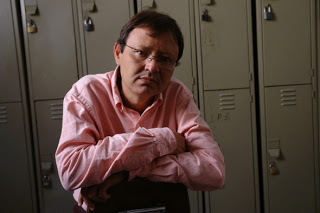
Translated from Spanish by Maria Alexandria Beech
Luis Enrique Gutiérrez Ortiz Monasterio
Hometown: Guadalajara, Jalisco.
Current town: Xalapa, Veracruz.
Q: Tell me about "I Hate Fucking Mexicans" at the Flea.
A: In formal terms, it’s a departure from my body of work because it’s not a study on the structure of character which comprises most of my plays. When Ana [Graham] asked me for a play for New York, we chose this one because of its potential to establish a dialogue with american culture, instead of the obvious option of sending a more conventional play as a calling card. In Mexico, this play has evoked extreme reactions. Either they like it a lot or they hate it, and they say I’m an idiot and that I shouldn’t write again. I don’t want audiences to say my plays are pretty; if that were the case, I’d rather knit acrylic sweaters. What I care about is making the audience uneasy in their seats. If that means I feel vilified in the process, well, what a pussy. For me, the theater is a political act, not about immediate politics, but of the other kind, of a courageous man, who is the actor embracing the words of a coward, who is the playwright, in order to confront his community, which is the audience. I don’t think there’s a more political act than this one.
Q: What else are you working on now?
A: This year, ironically, I’ve written a lot. In March, I started undergoing tests for a [kidney] transplant and my wife left me for a fucker. So I had to re-think the plan and I gave away my dogs who were my adoration. Bottom line, I was left alone like a Mennonite at a street corner. And it was for the better because I’ve been able get a lot of work done in bed. I finished the first part of a trilogy in collaboration with Ana Lucía Ramírez; I wrote the first five chapters of a theatrical police series, and I finished the first draft of my book on the theory of character.
Q: Tell me, if you will, a story from your childhood that explains who you are as a writer or as a person.
A: I decided to become a writer at the age of eight. Back then, they were preparing me to be a Marist [Catholic] priest and I wrote poems to the Virgin Mary. Since I’m the child of two sociopaths, I would hide in my closet with a reading lamp and I would read a lot, above all, nineteenth century poetry and novels about pirates. The first narrator I envied, to the point of wanting to write like him, was Joseph Conrad. I arrived at drama late; I was thirty years old when I started writing it formally. What I really wanted to be was a novelist, like Conrad, but no one liked my novels. For years now, I’ve hardly read anything. I only write.
Q: If you could change one thing about theater, what would it be?
A: I don’t understand the question. In my thirteen years as a playwright, I put forth two different models for writing theater which in my country and other places are constantly imitated. First, I developed a model in which everything begins from nothing, and that entails hiring the least number of actors and using minimum set design and props. The other model is related with the language of comics to achieve the opposite: developing a play with the most plots, characters, and transitions possible in an hour and a half. The idea is to create a novel that can be staged. I’m very ignorant about the theater which makes me certain that I didn’t invent either one really. Someone must have done it before. But in my arrogance, I’d prefer to think that I’m a genius who achieved twice what no one had achieved even once.
Q: Who are or were your theatrical heroes?
A: Aeschylus, Aeschylus, and Aeschylus
Q: What kind of theater excites you?
A: I don’t really go to theater. I have problems socializing and sitting in a fist of strangers and laughing at what they laugh at and crying with them. It’s not a big problem but I’d rather not do it.
*After the Mexican artists community raised $20,000 of the $30,000 Legom needs for a kidney transplant in Mexico, a group of artists in the United States launched a campaign to raise the remaining $10,000. So far, $4,366 has been raised. To donate, go here: www.indiegogo.com/legomproject.







Published on October 25, 2012 08:31
Entrevisto a Dramaturgos: Luis Enrique Gutiérrez Ortiz Monasterio
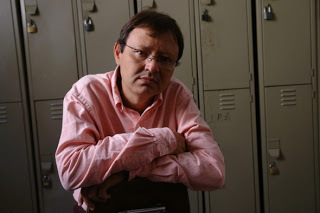
Luis Enrique Gutiérrez Ortiz Monasterio
Adonde nacistes?
Guadalajara, Jalisco.
Adonde vives ahora?
Xalapa, Veracruz.
Háblame sobre "I Hate Fucking Mexicans."
En términos formales es una obra fuera de corpus, pues no hace un estudio formal sobre la estructura del personaje como casi todas mis obras. Cuando Ana me pidió una obra para NY preferimos esta por lo que tiene para establecer un diálogo con ustedes, contra la opción obvia de mandar una obra representativa como business card. Es una obra que acá en México siempre ha desatado reacciones encontradas, o gusta mucho o la odian y dicen que soy un pelmazo y que no debería volver a escribir. No me interesa que el público diga de mis obras que son bonitas, de ser así tejería suéteres de acrilán, lo que me interesa es mover al espectador de su asiento, si eso implica que se sienta mancillado, pues qué marica. Para mí el teatro es un hecho político, no de la inmediatez política, sino de la otra, la de un hombre valiente, que es el actor, que asume las palabras de un cobarde, que es el dramaturgo, para confrontar a su comunidad, que es el público. No creo que se puedan nombrar actos más políticos que este.
En que estas trabajando ahora?
Este año, paradójicamente, he escrito mucho. En marzo estaba iniciando los estudios para el transplante y me dejó mi esposa por un pendejazo, así que tuve que reordenar el plan y regalé a todos mis perros, que eran mi adoración. El caso es que me quedé más solo que un menón en el semáforo. Y fue para bien, porque desde la cama he podido trabajar ampliamente. Terminé la primera parte de una trilogía en colaboración con Ana Lucía Ramírez, escribí los primeros cinco capítulos de una serie teatral policiaca y terminé el primer borrador de mi libro sobre teoría del personaje.
Cuéntame una historia de tu niñez que explica quien eres como escritor o como persona.
Yo decidí a los ocho años ser escritor. Entonces ya me preparaban para ser hermano marista y le escribía poemas a la Virgen María. Como soy hijo de dos sicópatas, me escondía en mi armario con una lámpara para leer, y leía mucho, sobre todo poemas decimonónicos y novelas de piratas. El primer narrador a quien envidié, al grado de querer escribir como él fue a Joseph Conrad. Al drama llegué tarde, a los treinta años fue cuando comencé a escribirlo con intenciones formales. Realmente yo lo que quise fue ser novelista, como Conrad, pero mis novelas no le gustaban a nadie. Desde hace años ya casi no leo, solo escribo.
Si pudieras cambiar algo del teatro, que seria?
No entiendo la pregunta. En estos trece años como dramaturgo ya propuse dos modelos diferentes de escribir para el teatro que en mi país y otras partes me imitan por todos lados. Primero desarrollé un modelo donde todo parte de la nada y se presenta el mínimo de actores y elementos escenotécnicos. El otro es un modelo que tiene mucha relación con el lenguaje del cómic para lograr todo lo contrario: desarrollar una obra con el máximo de situaciones, personajes y cortes diacrónicos en hora y media, la idea es llegar a la novela en la escena. Soy muy ignorante del teatro, por lo que estoy seguro que ninguno de los dos los inventé realmente, que antes alguien debió hacerlo, pero en mi arrogancia prefiero creer que soy un genio que logró dos veces lo que prácticamente nadie ha hecho ni una vez.
Quienes son o fueron tus héroes teatrales?
Esquilo, Esquilo y Esquilo.
Que tipo de teatro te emociona?
Realmente yo no veo teatro. Tengo problemas para socializar y sentarme entre un puño de desconocidos y reírme de lo que ellos se ríen y llorar con ellos. No son problemas fuertes, solo prefiero no hacerlo.
*Después que la comunidad de artistas Mexicanos recaudo $20,000 de los $30,000 que Legom necesita para un transplante de riñón en México, un grupo de artistas en Estados Unidos lanzo una campana para recaudar los restantes $10,000. Hasta ahora, $4,366 han sido donados. Para donar, por favor visite: www.indiegogo.com/legomproject.







Published on October 25, 2012 08:20
October 24, 2012
I Interview Playwrights Part 511: Colman Domingo
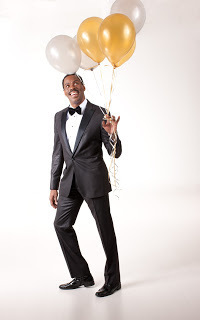
Colman Domingo
Hometown: Philadelphia, PA
Current Town: New York City
Q: Tell me about Wild With Happy.
A: Wild With Happy is a zany, crazy, out of it's mind new play that I both wrote and am acting in which is currently having it's world premiere production at the Public Theatre. It's about a forty-something year old man named Gil, played by yours truly, who loses his mother and the drama, hilarity and insanity that ensues. I've been calling it a "dark comedy about death and Disney World."
Q: What else are you working on?
A: Well, at the moment, I don't have a free moment between the hats I wear as actor and playwright at Wild With Happy, but I am really excited to say I'm in Steven Spielberg's upcoming film Lincoln - which I have seen and is spectacular as well as Lee Daniel's film The Butler, which will come out next year.
Q: How does your acting work inform your playwriting and vice versa?
A: Well, I feel that they really go hand in hand. I've always considered myself an actor's playwright. I am very sensitive to what is happening on stage, both when I am on and when I'm off. Making sure I am sensitive to how particular bits as well as the piece as a whole land on the tongue and then tweaking to make the piece sound and feel very clear.
Q: If you could change one thing about theater, what would it be?
A: Ticket prices! To make sure theatre is available for everyone regardless of your economic situation.
Q: Who are or were your theatrical heroes?
A: Geoffrey Holder, George Wolfe, David Belasco, Uta Hagen, The Lunts!
Q: What kind of theater excites you?
A: Theatre that slaps you in the face, makes you think, inspires you and shatters you to your core.
Q: What advice do you have for playwrights just starting out?
A: Follow your own voice - learn to be a storyteller based on what excites YOU about theatricality.







Published on October 24, 2012 07:22
October 23, 2012
I Interview Playwrights Part 510: Lucy Gillespie
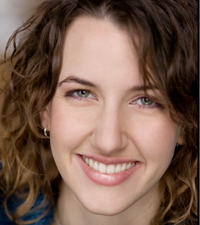
Lucy Gillespie
Hometown: London, England
Current Town: New York, New York
Q: What are you working on now?
A: Graduate School at NYU, mainly, but therein I have just started a play about rhetoric and faith. It will take place in the lobby of the Liberal Jewish Synagogue, where my parents used to send my siblings and I on Saturday mornings so they could fight in peace. It will feature some kind of horrific event, perpetrated by young congregants in the basement, and justified by (drum roll) rhetoric and faith. This is all conjecture, though; I haven't gotten far.
In preparation for Graduate School at NYU, however, I had a summer of spring cleaning. I finished a brand new play, A Responsible Adult, about a love triangle between a Kylie, a married tutor in her mid-twenties, Anya, her 15 year-old student, and Malachi, a 40 year-old musician. It's also the families we build for ourselves in New York. The girl is a prodigal cellist and the dude is a jazz musician, so in my head there will be extensive sequences of improvised jazz. That I did not write.
Q: Tell me, if you will, a story from your childhood that explains who you are as a writer or as a person.
A: Oh man. I was a nightmarish child. Here's one example:
I was the most popular kid (and only girl) in my Hebrew school class of awkward misfits. We all loved our teacher, John Haggard, who was funny and brought in great exercises that, like, made learning about Jewish identity fun! He also always brought in a box of Cadbury's Roses and at the break, he would open the box, lift it high above his head and tip it up so that brightly colored chocolates would tumble out onto the table. If I missed the frenzy, he would save me the orange and strawberry creams. The following September, we had a new teacher who I shall call Deborah. We hated Deborah. Deborah was strict and by the book. The class became less about games and discussions and more about learning Hebrew. She gave out homework and quizzes, she had a high-pitched, whiny voice, and she never, ever brought in Cadbury's Roses for us - or even Quality Street. She had to go. One day I just flipped. She was in the middle of some kind of complex, abstract, probably highly intelligent thought when I stood up and announced that we would continue the class under the table. I crawled under the table and one by one, the boys (my minions) joined me. First, Deborah laughed. Then she started to scold. Then she started to beg. Then she started to cry. Then she crawled under the table and, crouched like a hamster, finished the lesson. We never saw her again.
It frightens me - and I think about this a lot - that this is fundamentally who I am.
Q: If you could change one thing about theater, what would it be?
A: Audience participation. There should be more of it.
Q: Who are or were your theatrical heroes?
A: Shakespeare, Stoppard, Churchill, Knee-High, PunchDrunk. Mac Wellman's Chrestomathy completely rewired the way I think about theater. And I drop everything when TJ Jagodowski and Dave Pasquesi come to town.
Q: What kind of theater excites you?
A: Stuff that really commits to itself? When it patiently and organically unfolds - as opposed to rushing to define itself as one thing or another, or conform to some kind of structural or narrative formula (which always makes the play seem overdeveloped). Can you tell that I'm in grad school? I love anything that's smart but also gut-wrenching...
Q: What advice do you have for playwrights just starting out?
A: Self-produce! You will not regret it. Figuring out how to ask people for money is about the best skill you can learn...
Q: Plugs, please:
A: OUTFOXED - about an American study abroad student who gets caught up in a SEX DRUGS VIOLENCE scandal in Italy, and must be bailed out by her mother - is being produced by FullStop Collective, November 30th - December 16th at the Access Theater.
Also: THE ATWATER CAMPAIGN - about the rise and fall of spin-doctor sonofabitch, Lee Atwater, with original blues music - is being produced as part of terraNOVA Collective's Groundworks Reading Series, Sunday December 9th at 3pm.
Also: YOUNGBLOOD Brunches! If you've never been, they are the BEST and the MOST FUN. And I might even get around to writing one this year!







Published on October 23, 2012 07:47
October 21, 2012
I Interview Playwrights Part 509: Randall Colburn
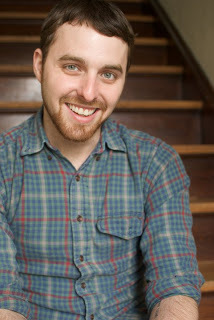
Randall Colburn
Hometown: Mt. Clemens, MI
Current Town: Chicago, IL
Q: What are you working on now?
A: Currently writing a play about Christian youth at an Acquire the Fire-type festival, which is on commission from Writers' Theatre. Also adapting one of my plays into a TV pilot, which has been an intense, but satisfying experience. Other productions in the works, but unannounced as of yet.
Lately, I've also been dabbling in Chicago’s storytelling scene. I'm not really an actor, but writing and performing first-person pieces analyzing current events through the filter of my own experience is scratching an artistic itch for me.
Q: Tell me about B-Rated.
A: Ha. Well, I’m giant fan of bad movies, horror movies, and bad horror movies. The show began in college, when my friend Tim Marklevitz and I would babble on about stupid movies in the film department’s editing bay. We, along with several other friends, were working on shows that aired on the campus TV station and would be up into the wee hours editing. Somebody always had a video camera, and that’s where these videos began. http://www.youtube.com/watch?v=H5Y9KF6N-RU
Once Tim moved to LA, he decided to spruce up the format a bit. We changed the title to B-Rated, amped up the production values, and started scripting our material, wherein I’d use all the bullshit I learned in grad school to dissect movies like Evil Bong and Shark Attack 3: Megalodan. Unfortunately, since Tim and I live across the country from each other, we were only able to film new episodes when we were in the same time zone, and it’s been a long time since that’s happened. It’s too bad because with the release of every new episode we’d garner good press and increased interest; I wonder where it could’ve gone if we were able to crank ‘em out regularly. http://www.youtube.com/watch?v=BN7dM297MrA
The best thing to come out of B-Rated was the chance to appear in Best Worst Movie, a popular documentary about Troll 2, which some consider the worst movie ever made. The makers of the film, who were also the stars of Troll 2, caught wind of our series and asked us to host a Chicago screening of the movie at the Music Box. Tim and I had to pinch ourselves at Ann Sather the following morning, when our bad movie heroes bought us eggs and expressed honest interest in our endeavors. Then they interviewed us for the documentary, and we ended up prominently featured as talking heads. Bragging rights for life.
Q: How would you characterize the Chicago theater scene?
A: Chicago is a city of ingenuity. Chicago is a place to experiment. Chicago is a place to self-produce. Chicago is a place where a couple hundred bucks can produce that show. Chicago is a place to indulge artistic whims. Chicago is a place where houses are typically a quarter full. Chicago is a one-critic town. Chicago is a place to begin, a place to reside, a place to die. Chicago is a place people often leave. Chicago is a place people are afraid to leave. Chicago feels like home. Chicago is a place where brilliant works of art extinguish like flashbulbs in the bowels of a Pilsen warehouse. Chicago is a place where enthusiasm often trumps talent. Chicago is a place where you work for free. Chicago is a place where you discover your aesthetic. Chicago is a place where people embrace poverty and PBR.
Chicago is focused on companies. So many companies. A new company every day. Chicago is a place where anyone can produce. And that’s important. And that’s why Chicago produces hard workers, passionate artists. Chicago theater is a weary beast with sad eyes, coated in a glistening sheathe of sweat.
Q: Tell me, if you will, a story from your childhood that explains who you are as a writer or as a person.
A: I had a giant collection of action figures, mainly from the WWF, Teenage Mutant Ninja Turtles, Star Trek, and films such as Jurassic Park and Aliens. I was really into WWF, so I’d make them all converge in the ring, to the point where I’d basically created my own federation rife with humans, dinosaurs, and monsters alike. Since the storylines and rivalries I’d create we’re so intricate I’d say this, in some ways, led to my passion for ensemble storytelling. When, in fifth grade, I decided to write my first novel, I orchestrated its action with these same action figures over several months, fine-tuning each moment with the utmost care and concentration. It was building the world I liked, creating a world. When I finally wrote the novel, a 125-page rip-off of Jurassic Park called Death in the Making, it consisted of about 20 main characters spread across seven or eight different plot threads. I love exploring the nooks and crannies, the quiet moments in-between the loud ones; that, I think, is where the heart of a piece lies. Though the action figures have long since disappeared in dust, I try to build worlds in a similar way, by fine-tuning every small moment, every throwaway phrase.
Q: If you could change one thing about theater, what would it be?
A: Things that need to stop:
* Ghosts onstage only one person can see
* Plays about rich white people learning how to be a little less awful
* Plays that should be movies
* Saying theater is dead
* Speaking in simultaneity for no discernible reason
* Gimmicks.
Q: Who are or were your theatrical heroes?
A: Spalding Grey. Chekhov. Jeremy Menekseoglu. Stuart Carden.
Q: What kind of theater excites you?
A: Theater that’s uncomfortably, almost unbearably, honest. Vulnerability. Ambiguity. Theater that pushes buttons without resorting to sensationalism or gimmicks. Theater that experiments with genre—show me an affecting horror or sci-fi play and I’m smitten.
Q: What advice do you have for playwrights just starting out?
A: Make your own opportunities. If nobody will produce your play, produce it yourself. Don’t be afraid to fail. Also, never write a scene you don’t want to write.
Q: Plugs, please:
A: DON’T GIVE THAT BEAST A NAME with the Chicago Mammals. It’s a show I co-wrote with Bob Fisher, who’s a damn genius. Appalachian gothic comedy/drama/horror with music. Info here: http://chicagomammals.blogspot.com/







Published on October 21, 2012 12:25
October 20, 2012
I Interview Playwrights Part 508: Bilal Dardai
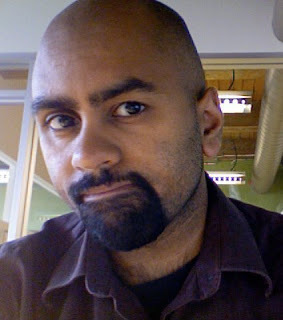
Bilal Dardai
Hometown: Downers Grove, IL
Current Town: Chicago, IL
Q: What are you working on now?
A: Currently performing in The Neo-Futurists' production of 44 Plays for 44 Presidents and working on a first draft of a play called The Abacus for Stage Left Theatre, both in Chicago.
Q: Tell me, if you will, a story from your childhood that explains who you are as a writer or as a person.
A: Around my house we had, I would guess, over a dozen separate decks of playing cards, most of them incomplete, many of them souvenirs from gift shops at vacation spots. My favorite game was to take all of these decks and build sprawling card-labyrinths out of them on the living room floor, including a roof, and place tiny plastic figurines into different parts of the structure. I'd then stand a few feet away and toss marbles at it, causing it to collapse in sections, occasionally discovering a figurine among the rubble. I always made up a small story for each character in the maze--what they were doing in the maze when they met their untimely end--as well as a reason that I was bombarding the maze in the first place.
I did this for other games as well...I invented a highly complicated scenario of gangland warfare in a city setting to spice up Parcheesi, including rational justifications for many of its otherwise unexplained rules, such as the reason a pawn couldn't leave its starting point without a die roll of six. Generally speaking, I'm unsatisfied when I don't have a "why" for a situation in front of me, and I'll dig as deep as I can to find one...but In the absence of that explanation, I make one up.
Q: If you could change one thing about theater, what would it be?
A: I occasionally feel like there's just too much preciousness about what is and is not considered "theater" and it leads to a distasteful negativity about the art form. That is, a few people decide what is and is not legitimately theater and then wring their hands when they see work that fails to meet these standards. As far as I'm concerned an act of theater is an act of one person telling another person a story, live and in real time. It's still theater if that story doesn't make it to Broadway, or if the storyteller didn't get their MFA from Yale. It's still theater even if you don't like the story. Theater cannot die until there are less than two people alive in the world, so I'm tired of hearing that the art form is on its way out. Certain versions may be fading away, but theater itself is robust.
Q: Who are or were your theatrical heroes?
A: I feel like I learn at least a little something from every theater artist I encounter, but if I had to name a a few names from whom I learned a lot--Lanford Wilson for his experiments in narrative (such as The Rimers of Eldritch and Balm in Gilead); Harold Pinter for showing me the power of words unwritten and unspoken; Aaron Sorkin for making me understand how you can discuss very large things by applying principles of rhythm and music. Among artists I know, I'm deeply grateful for the work of Mickle Maher and my Neo-Futurist colleague John Pierson--the former for the ways he has combined heart and head in his writing, the latter for a performance art aesthetic that consistently seeks out personal risks and occasionally traffics in elliptical storytelling but which celebrates and invites the audience into whatever notions are being explored.
Q: What kind of theater excites you?
A: Theater that finds ways to make me think about the world a little differently than I did before. Escapism and pure fiction are fine with me, but I really love stories that give me something new to consider. I've heard some people say that they go to the theater to see people who are just like them. I want to see people I don't know that well and hear stories I don't often hear.
Q: What advice do you have for playwrights just starting out?
A: Remember that above all else the form is collaborative, so be open to the ideas of other artists, who have the advantage of living outside of your own head. I know that you poured your blood into the script and you want it exactly the way you envisioned it, but when you find those actors, directors, and designers who completely understand your voice and ideas, they will do to your work what you are not capable of doing alone. If you're unwilling to let anybody else add their voice to the production, you should be writing novels.
Q: Plugs, please:
A: 44 Plays for 44 Presidents runs through November 10 at The Neo-Futurarium in Chicago. I also regularly write and perform in the company's late night show Too Much Light Makes The Baby Go Blind, which runs 50 weeks a year on Fridays, Saturdays, and Sundays.








Published on October 20, 2012 09:01
October 19, 2012
I Interview Playwrights Part 507: Will Goldberg
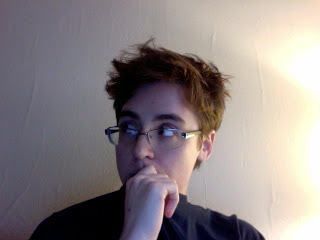
Will Goldberg
Hometown: Boston, MA
Current Town: Chicago, IL
Q: What are you working on now?
A: My current project is called Home Before Dark, and it's about a fifteen-year-old boy, Sean, who's in a sexual relationship with a man in his early thirties. Over the course of the play, Sean starts to come to terms with the true nature of the relationship and whether he can escape.
I originally conceived of the play as an experience that would take place in the "real world," not a theater space, and unfold in real time over a period of several weeks. The audience members would receive text messages or emails that Sean and the man sent to each other to arrange meetings around Chicago, and then observe/eavesdrop on those meetings as they happened. (There would be very small audience groups, and several opportunities to see each scene.) I was interested in dropping audience members inside Sean's situation to show how these crimes happen all around us without our knowledge, and that they're often nothing like the way we imagine them. Because the logistics are so tricky, I've since reworked it into a more traditional format, but I'm still working to keep it intimate and difficult. (I also hope to return it to the original format one day.)
I'm also applying to graduate schools this winter, which is a hilarious and terrifying undertaking. Even if I'm not accepted anywhere, having to articulate my goals and explain my work so many times has already been enormously valuable. I'd still prefer to get in somewhere, though, don't get me wrong.
Q: Tell me, if you will, a story from your childhood that explains who you are as a writer or as a person.
A: When I was a kid, I went to the same overnight camp for several years. We had a few dozen numbered cabins, but there was no Cabin 19. The counselors told us that there was no Cabin 19 because it was the founder's birthdate, but that never seemed like a good explanation, and so camp myths sprang up about where Cabin 19 had gone. I first heard the general story at age eight. It went something like this:
Cabin 19 had been one of the girls' cabins, and housed a camper with red eyes "a really long time ago." (This was also supposed to explain why some years were missing from the collection of all-camp photos dating back to the 1930s. When her eyes showed up red even in black-and-white photos, the camp staff had orchestrated a coverup.) One night, she had burned down Cabin 19 with her cabinmates inside, and the camp hadn't rebuilt it.
Two or three years later, I got the chance to tell the story to several kids in my cabin who hadn't heard it before, and decided to punch it up a bit. It got away from me pretty quickly. The girl from Cabin 19 had showed up the first day of camp with a dirty backpack and a few changes of clothes. Nobody had seen who dropped her off. She was mean to her cabinmates and they were mean in return, spreading rumors that she was a "devil child" and that was why her eyes were red. (To an eleven-year-old, the red eyes were way too awesome to leave out.)
The night she finally snapped, the girl from Cabin 19 set the fire by flicking her thumb like a lighter, because of course she was a devil child, and when the cabin was in flames, she ran inside to die with everybody else. For years afterward, Cabin 19 would reappear at different places around camp -- behind the dining hall, in the middle of the lake -- and burn down again, which apparently I thought was really eerie. And of course it hadn't happened for several years, so we were due.
My retelling scared the shit out of my cabinmates and sparked a jittery debate about which of us were in the most flammable parts of the cabin. Were the kids in the wooden bunks worse off than the kids in the metal ones? Could we knock the screens out of the windows if we needed to escape? We made a bunch of frantic plans, but finally everybody calmed down enough to go to bed. Everybody except me.
I knew that I'd made up most of the story, but it was hard to remember that in the dark. It took several tense hours to fall asleep, and I was jittery for a few nights afterward.
At camp a few years later, I overheard an older kid telling a new camper the story of the girl from Cabin 19, and my additions were in there, which made it all worth it.
Q: If you could change one thing about theater, what would it be?
A: It would be wonderful to have widespread opportunities to be an "assistant playwright" the way my director friends were able to be assistant directors, like the idea Len and Zak Berkman discuss in this interview.
If I could change two things, I'd really like to stop seeing productions using modern technology (Twitter etc.) just because it's modern. I went to a show once where the audience was encouraged to tweet things to the fictional workplace where the story was set, and then the tweets were on a screen behind the actors. What a douchey thing to do to your actors, encouraging people to not pay attention to them in favor of an idea that added absolutely nothing. There are a ton of fascinating things to do in theater with social networking and other technology, but we should be using them to underscore themes and enhance story, not detract from people's hard work with bells and whistles.
Q: Who are or were your theatrical heroes?
A: Archibald MacLeish's play J.B. knocked me on my ass when I was sixteen. I had to read it for English class and couldn't get enough of it -- I had to read it out loud to myself, over and over. J.B. was probably the play that did the most for my understanding of rhythm and sound and their enormous power.
When I was at the National Theater Institute in 2006, we went to see Sarah Ruhl's Eurydice at Yale Repertory Theatre, and it was like nothing I had ever seen. There's a lot to love about it, obviously, but one part in particular made my hair stand up: when the dad finishes writing a letter and sticks it to the wall, and you see that the "bathroom tiles" behind him are actually dozens and dozens of letters he's written. I was completely floored by the way that moment did so many things: the way it changed my understanding of a set I had taken at face value, what it says about the metaphysics of the play's world, and the emotional implications for the character who has written so many letters.
And he's not a theatrical hero, but the novelist Kazuo Ishiguro has been a huge influence on me for several years. My favorite book of his is Never Let Me Go, but all his work has such masterful subtlety. Little is said, but the facts pile up around you very softly, and at some point you realize what you've been looking at the whole time. Your subconscious brain does so much work. I've got a long way to go before I'm anywhere close, but it's a good horizon to head toward.
Q: What kind of theater excites you?
A: Recently, I've gotten interested in the kind of theater that exploits the shit out of the fact that the audience is physically in the same place as the story. So much of our entertainment is created so far away from us in time and space, and theater's immediacy and concreteness are huge assets for us. When I'm working on my next project, I'm hoping to explore that stuff especially as it relates to non-sight, non-sound senses. What story needs odors to be told? There's a good one out there.
Q: Anything else?
A: I'm a little embarrassed that I've used so many adjectives in this. Just pretend they're not there.
Q: Plugs, please:
A: I don't have any work currently in production, but I blog at williamgoldberg.blogspot.com. (Now that I've given out the link, I'll have to update more.)







Published on October 19, 2012 07:42
October 18, 2012
I Interview Playwrights Part 506: Robert Plowman
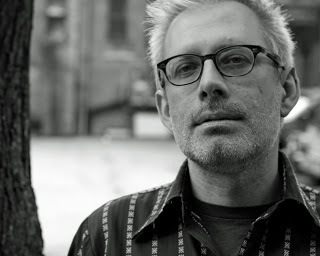
Robert Plowman
Hometown: Halifax, Canada
Current Town: Toronto, Canada
Q: What are you working on now?
A: Right now I’m writing a solo show called My Sex Rays Will Cover The Earth. It’s inspired by the story of a man named Wilhelm Reich, who was a disciple of Freud’s in Austria in the 1920s and seemed destined to be a major figure in the development of psychoanalysis. But Reich’s research became more and more unorthodox as he focused on the orgasm as the defining diagnostic feature of a person’s psychological health. In time, Reich discovered what he believed to be the fundamental energy of the cosmos — something he called Orgone energy — which passes through all of creation, and is manifest in the healthy person through orgasm. By contrast, Reich argued, blockages of Orgone energy result in cancer and disease. It’s a classic mad scientist story that unfolded in mid-century America. There is the Utopian dream, and there are the fools! the fools! who stand in the scientist’s way. In this case, the fools were the Food and Drug Administration who jailed Reich in the early ’50s for fraud. And eight tons of the man’s books, journal articles and private papers were burned at Reich’s own expense in a New York state incinerator. That he survived Nazi-occupied Europe only to be subjected to this massive book burning in the U.S. of A. is particularly heartbreaking. Even if the man’s science was entirely gobbledygook. It’s like Brecht’s Galileo, if Galileo was wrong. This will be my thesis play in my graduate program, the Playwright’s Lab at Hollins University.
Q: What else are you working on?
A: This winter I’ll write the final draft of The Muse Factory, my beatnik play. It takes unpardonable liberties with the lives of Burroughs, Ginsberg, Kerouac, et al. to tell a story that could best be described as: red-hot smut. Pure filth. The Muse Factory looks at the true nature of obscenity and the notion of “dirty words”.
Also, I’m writing The Mnemonist for Lohifi Productions, a Canadian company whose work is based in found-object puppetry and performance in non-traditional theatre spaces. The Mnemonist is a Canadian Cold War spy story, set in that hotbed of espionage, Ottawa. The play is Hitchcock by way of Kafka, and is concerned with the question of identity in a world where everyone is a foreigner, an immigrant, a person in search of a home.
Q: How would you characterize the Canadian theater scene?
A: The answer I usually give when people ask me about Canadian theatre is that we’re pitched between the British and the American traditions: where the British tends to be more concerned with ideas and the American with the emotional journey of the individual. That’s a huge generalization, of course, but playwriting in Canada is very young and for a long time Canadian theatre was entirely in the shadow of the US and the UK. Before 1968 there was scarcely any history of Canadian theatres producing original Canadian plays; looked at another way, this means that most Canadian playwrights who’ve ever produced are still alive. I think there’s something hopeful in this.
For a long time I thought the most exciting theatre being made in this country was coming from devising companies. And I’ve spent a lot of time collaborating with ensembles that usually work without a writer and seeing what happens when, y’know, I put my proverbial chocolate in their peanut butter, and vise versa. As a playwright I keep looking for a home: a theatre or theatres where, if only for a little while, I can belong; where I’ll find co-conspirators for my mad plans — to offset the long, lonely, boozy hours of staring at the computer screen by myself.
So the real answer to the question about Canadian theatre? I’m living in Toronto and enjoy living here, but I still struggle to find a place in this country where my work makes sense, to find the people I want to work with. This was part of what sent me back to grad school at the Playwright’s Lab in Virginia. And I think it’s a lifelong challenge: finding the people you want to live your creative life with.
Q: Tell me, if you will, a story from your childhood that explains who you are as a writer or as a person.
A: In high school I went to a national debating tournament in St. John’s, Newfoundland. Among the cultural activities planned for the young debaters was being bused to a lonely outcropping of cliff surrounded by fog and being told, Now you are standing on the eastern-most point of North America. I couldn’t see anything at all. Next, we were bused to a high school, seated in those standard high school desks under standard fluorescent lighting and told we were going to see a lecture. A rumpled man started writing on the board in chalk, lecturing us about science. As it seemed to me the whole purpose of being at this tournament was not to be in school, well, this was all far too school-like. I fell asleep. And when I woke up the lecture on science was something else entirely. It wasn’t a lecture, I realized, but a play. And though I’d slept too long to have any sense of what was happening in front of me I was totally entranced. I still have no idea who that performer was, but he blew my mind. And I think that’s still what I look for in theatre: that moment when everything you think you know turns inside out in front of you.
Q: Who are or were your theatrical heroes?
A: Chekhov. Barker. Churchill. Stoppard. Webster. The Wooster Group. Anne Bogart. The Nature Theatre of Oklahoma. Greg Moss. 13P. Number 11 Theatre, which no longer exists but made the most amazing play I’ve ever seen. All my teachers, especially, most recently, Carl Hancock Rux, who’s my thesis advisor and knocks my socks off. 53rd State Press.
Q: What kind of theater excites you?
A: Theatre that is fearless.
Q: What advice do you have for playwrights just starting out?
A: I’d say, see all the theatre you can. Read all the novels you can, and newspapers and books of poetry too. Go to the art gallery every chance you get. See live music. Forget what theatre is supposed to be and then start writing. Diane Arbus said, “A photograph is a secret about a secret; the more it tells you, the less you know.” Someone once asked Allen Ginsberg how you get to be a prophet; his reply was, Tell your secrets. Write photographs and concerts and paintings and poems. Tell your secrets. Keep writing.
Q: Plugs, please:
A: On November 3, I’m contributing a 10-minute play to the Red-Eye 24-Hour Play Festival, which is happening coast to coast with a host theatre in each time zone: at The Spot, Arroyo Grande CA; University of Great Falls Theatre, Great Falls MO; the Lincoln Loft, Chicago IL; and the Hamner Theatre, Crozet VA. The festival was started by one of my friends in the Playwright’s Lab and, at least for this first year, it exclusively features writers from my MFA program. I’m excited for it to showcase the crazy diversity of playwrights coming out of my school. Go team!
On November 18, there’ll be a staged reading of my play A Girl Called Nothing in the Discovery Reading Series, in Roanoke VA. The play is my adaptation of Congreve’s Way of the World: set in the 1980s, it’s one half Wall Street, one half Repo Man.
And in February 2013, my play The Matador is going up at Mill Mountain Theatre, in Roanoke. It’s a love triangle that takes place in the bullfighting ring — a darkly silly comedy, full of song and dance, inspired by the untranslatable Spanish word duende.
robertplowman.com







Published on October 18, 2012 11:28





















